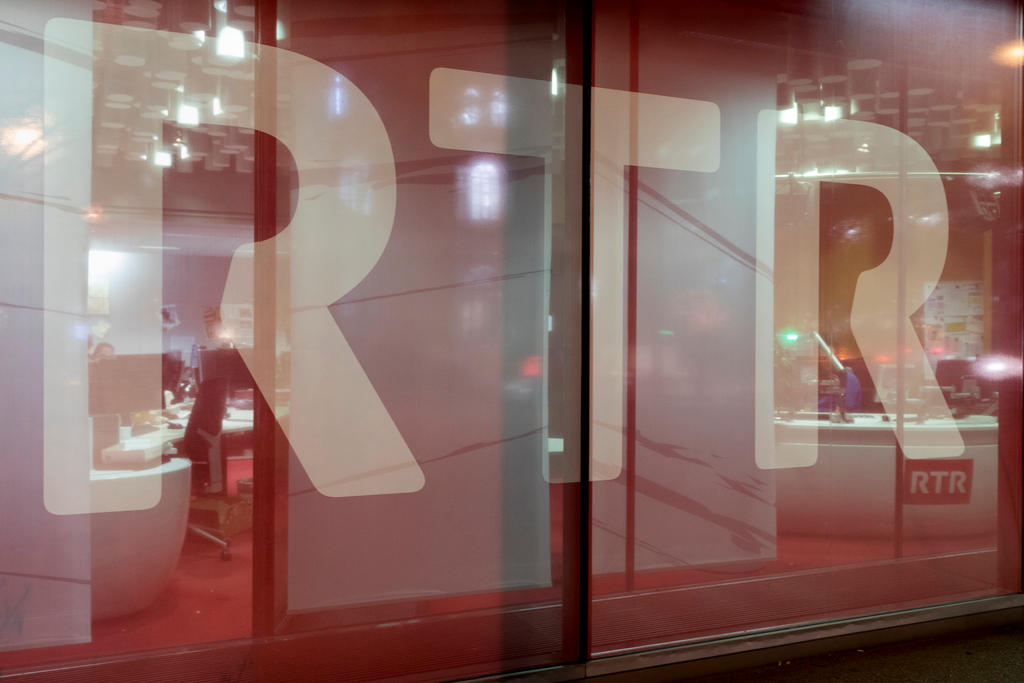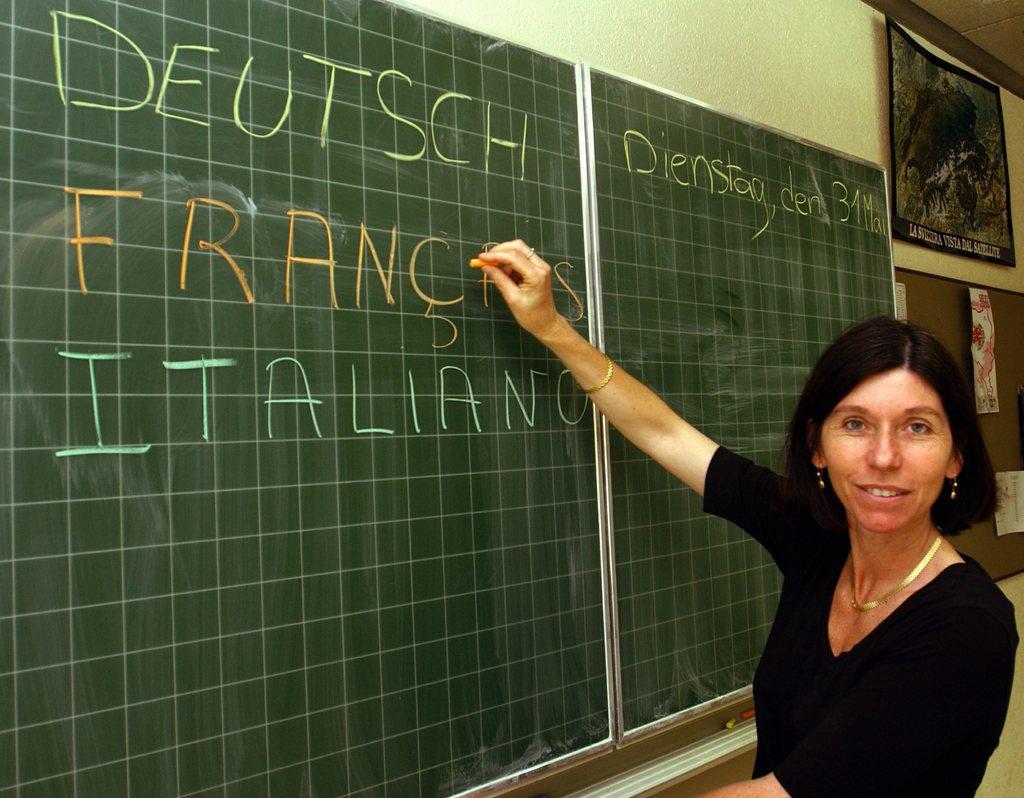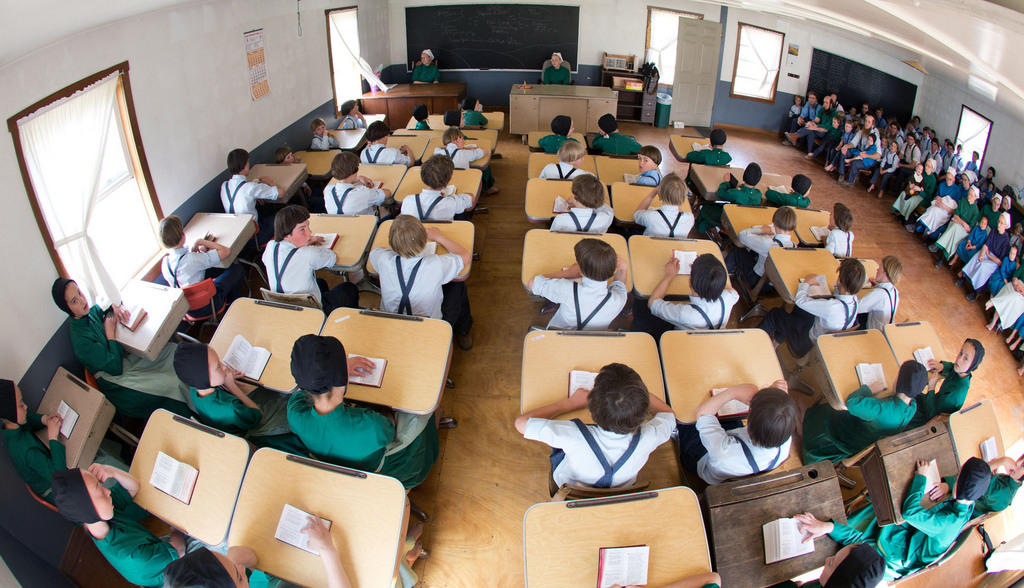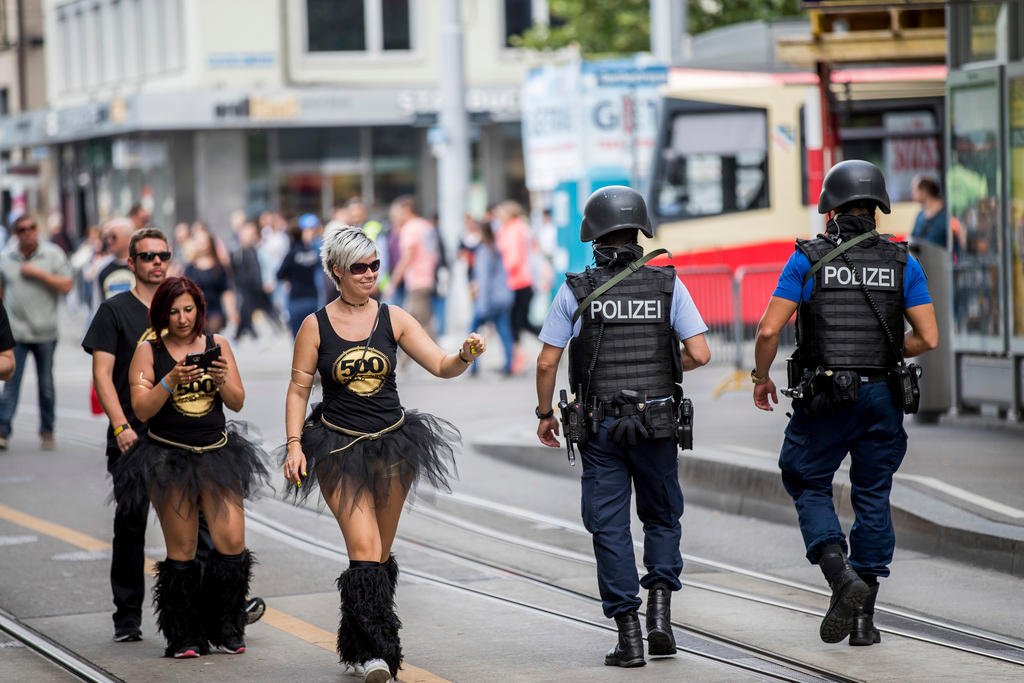Why the Swiss still speak in dialects

In German-speaking Switzerland, people who cannot speak dialect end up feeling left out of things. In French-speaking regions, however, speakers of patois are hard to find. Use of dialect differs in the different language regions of the country. The reasons are surprising.
Phone conversation:
“Kantoonspolizäi, Grüezi” (Cantonal police, morning)
“Süddeutsche Zeitung aus München, Grüzi” (This is the Süddeutsche Zeitung in Munich, morning)
“Grüss Gott” (Hello)
This dialogue, with its abrupt switch from Swiss dialect to High German (and for which there’s no real English equivalent), took place on an emergency response line. The calls were recorded for research purposes and studied by a team at the University of Fribourg led by Helen ChristenExternal link.
According to Christen, the brief dialogue shows how German-speaking Swiss – even policemen – habitually begin any conversation with a stranger in dialect, and then, if they pick up cues that the person is not a dialect speaker, they switch to High German.
This can mean that switching to High German may be felt as offensive by the other person, because they take it as a signal that they do not belong. It may happen that a person is automatically addressed in High German and not in Swiss German because their skin is a different colour or they look somehow foreign, even before the person has opened their mouth.
+ How easy is it for Germans to learn Swiss-German dialect?
No one speaks just dialect
In German-speaking Switzerland, dialect is not a marker of low social class as it is in many other countries. Everybody speaks it – at home and at work. Even radio and television are to a great extent in Swiss German. This trend is not likely to change – far from it.
“There are indications of an increase in the use of dialect, especially in schools and the media,” says Regula SchmidlinExternal link, professor of Germanic Linguistics at the University of Fribourg. This goes with the tendency towards informality in communication, which favours the use of dialect.
Convergence of Swiss German dialects?
It is true that the position of Swiss German dialects is particularly strong. But due to geographical mobility, dialects are becoming more alike, so that “regiolects” are developing. It is mostly the characteristic rural dialects that are losing out. In the future it will no longer be so easy to tell from someone’s speech what village, town or valley they come from.
According to Schmidlin, however, there is also a counter-tendency. News on Swiss public radio and television has been more strictly High German since 2007. And today there are hardly any people who say they speak only dialect. In other words, most German-speaking Swiss use dialect but also High German and switch between the two depending on the situation.
Because younger people in particular are likely to use dialect in written communication of an informal nature, such as SMS, Christen thinks a kind of “bilingual literacy” may develop in German-speaking Switzerland.
Dialects disappearing?
The situation in the French-speaking part of the country is very different. Until the 19th century, people in the Jura region (on Switzerland’s western border with France) spoke a dialect called “Patois jurassien” or “Franc-Comtois” (also known as “Frainc-Comtou”); elsewhere in the west of the country they spoke Franco-Provençal dialects. These are not really dialects of French, but a distinct Romance language. In French, rural dialects are habitually called “patois”.
Franc-Comtois (Frainc-Comtou) or “Patois jurassien”
Franc-Comtois is a dialect of the Langue d’oïl, the historic language group to which French belongs. It was spoken in what is now the Swiss canton of Jura and the neighbouring region known as the Franche-Comté in France.
Franco-Provençal
Franco-provençal is not a French dialect, but a Romance language in its own right, like Romansh in Switzerland.
Nowadays most French-speaking Swiss speak a regional variety of standard French with a local accent. The traditional dialects have all but disappeared.
“Today there are only three places in French-speaking Switzerland where traditional dialects are spoken at all,” says Romance linguist Andres KristolExternal link at the University of Neuchâtel. He lists the Gruyère region and the French-speaking section of canton Valais as places where Franco-provençal is spoken, as well as Ajoie and the “Free Mountains” in the Jura, where a few people still know “patois jurassien”.
“But even there the dialects are disappearing: the last generation of speakers are all over 60 and the number of speakers is declining fast.”

More
Patois Evolène 1939
French Revolution and industrialisation
Why this striking difference from German-speaking Switzerland, where dialects are still thriving? For Kristol there are several reasons – internal ones, but also ones imported from France:
– French Revolution:
In France, patois was condemned during the French Revolution. “For ideological reasons, the revolutionaries declared that one had to speak French in order to be a good Frenchman,” says Kristol. “They told the French people that their dialects were ‘corrupt French’ and that speaking dialect undermined the ‘purity’ of the French language.”
During the Napoleonic régime in Switzerland these ideas were imported into French-speaking Switzerland. Yet Kristol says that the French Revolution was not the main reason for the decline of patois in Western Switzerland, economic factors being more important.
– Industrialisation:
In the early 19th century the Jura region became a population magnet due to the newly granted feedom of settlement as well as rapid industrialisation. “Workers from all over Switzerland streamed into towns like La Chaux-de-Fonds and Biel,” says Kristol. Since dialects in Western Switzerland were very diverse and it was hard for their speakers to understand one another, standard French became the common means of communication.
The depopulation of the countryside had another effect too. Because sons and daughters of French-speaking Swiss peasants were moving to the cities and towns to find work, abandoned farms were taken over by German-speaking Swiss peasants. Their children learnt standard French in school, not dialect. According to Kristol, the regions of Western Switzerland that kept their dialects longer were the ones less affected by industrialisation, flight from the land and population change. “But here too increasing mobility of the population since about 1920-1930 worked against the survival of traditional dialects.”
Nazi Germany impact
In Italian-speaking Switzerland, too, economic change and internal migration led to a decline of the Lombard dialects. Whereas up until the 1960s most people in Ticino spoke dialect at home, by 2012 it was only 30%. There has been a similar trend in the Italian-speaking part of canton Graubünden in the east, but it is less noticeable, as these valleys were always more isolated.
Immigration from Italy to canton Ticino as well as social and economic change resulted in standard Italian becoming more important in the workplace. “In the 1950s and 1960s there arose a kind of stigma about dialect,” explains Matteo Casoni of the Linguistic Institute of Italian SwitzerlandExternal link. “Parents wanted a prosperous future for their children and regarded dialect as a barrier to career and social advancement.”
Casoni provides historical reasons for the marked differences between Italian- and German-speaking Switzerland: “In German-speaking Switzerland dialect had an identity-creating role in distinguishing the nation from Germany. In Ticino too there was a desire among people to mark themselves off from Italy and Mussolini, but it was not so strong.”
Meanwhile, in Italian too, digital communication and social media have led to a revival of dialects. “Through digital communication dialect got back a positive image. No one expected that!” says Casoni.
Romansh is ‘in’
Switzerland has a fourth national language: Romansh. This is spoken in Graubünden and is again a distinct Romance language. It is thought to have arisen from a mixing of the vulgar Latin brought by the Roman legionaries with Celtic and the language of the original inhabitants, the Rhaeti. Over the centuries, numerous dialects arose and gave rise to five distinct written varieties of Romansh which are known as “idiomsExternal link”.
This variety – or lack of unity, according to some – makes it difficult to maintain the language today. Whereas in the first half of the 19th century most of the Graubünden population spoke Romansh, today only about a fifth do. Most Romansh speakers are bilingual – as well as their own “idiom” they speak and write German – which is an added strain on all the Romansh varieties.
+ Hear how Romansh can be pretty scary
In the past 20 years the image of Romansh has experienced a boost. Whereas at one time it was fashionable to dismiss it as a “language of peasants”, today it is “in”. Many young people in the arts use Romansh creatively. Catchy new brand names in the region are likely to be Romansh rather than the otherwise inevitable English. Recently a bank took the name “Cler”External link, which means “simple, clear” in one of the Romansh varieties.

More
Romansh-speakers call for more government support
Language or dialect?
The distinction between a dialect and a language is not all that straightforward. There are linguistic but also historical and political criteria involved in deciding whether a language is “just” a dialect or is a language in its own right.
Language = Speakers understand each other. The language is definitely distinct from all other languages. Ideally there is a standardised written language and a common literature.
Dialect = a local or regional variety, which differs from the standard language.
Regiolect = A dialect spoken over a whole region.
Sociolect = a dialect spoken by a particular social group.
Idiom = term used to denote a standardised written variety of Romansh used by speakers of a particular cluster of dialects.

In compliance with the JTI standards
More: SWI swissinfo.ch certified by the Journalism Trust Initiative




You can find an overview of ongoing debates with our journalists here. Please join us!
If you want to start a conversation about a topic raised in this article or want to report factual errors, email us at english@swissinfo.ch.